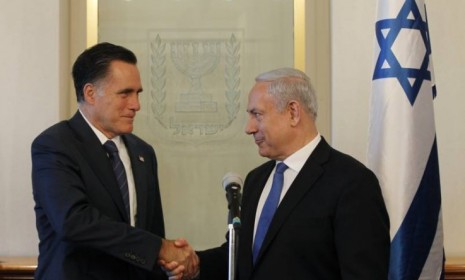Would a President Romney kill the Arab-Israeli peace process?
Mitt Romney ticked off Palestinians and took a conspicuously Israeli view of the Mideast stalemate during his foreign tour. Could he ever broker peace?

A free daily email with the biggest news stories of the day – and the best features from TheWeek.com
You are now subscribed
Your newsletter sign-up was successful
Mitt Romney infuriated Palestinians when, during his trip to Israel, he called the disputed city of Jerusalem the nation's capital and appeared to suggest that an inferior "culture" was to blame for the much lower standard of living in the West Bank and Gaza — without mentioning the economy-stifiling Israeli stranglehold on Palestinian movement and finance. Romney denies that he was speaking about "the Palestinian culture, or the decisions made in their economy," even while doubling down on his thesis about culture determining economic vitality. But his remarks in Jerusalem were widely condemned: China's state news agency warned that Romney's comments were "likely to worsen the already tense Mideast situation, and even reignite a war between Palestinians and Israelis," and senior Israeli Foreign Ministry official Alon Leil said: "We need the U.S. as an honest broker for peace, between us and the Palestinians.... There are no signs that Romney understands it." If Romney wins in November, would he be able to pursue the two-state solution U.S. presidents have tried to broker for decades?
Romney would be disastrous for Mideast peace: Romney's hawkish rhetoric on Israel and serial insults of Palestinians may have delighted his wealthy, hardline backers, says Douglas Bloomfield at The Jerusalem Post, but it "could prove disastrous should he become president." A two-state solution is the only viable route to a lasting peace, and it's now clear that if a President Romney "decides to pursue Israeli-Palestinian negotiations he will start with a great disadvantage, and that won't be good for the United States or Israel."
"Washington Watch: Is Romney ready for prime time?"
The Week
Escape your echo chamber. Get the facts behind the news, plus analysis from multiple perspectives.

Sign up for The Week's Free Newsletters
From our morning news briefing to a weekly Good News Newsletter, get the best of The Week delivered directly to your inbox.
From our morning news briefing to a weekly Good News Newsletter, get the best of The Week delivered directly to your inbox.
But Romney's right — Palestinians aren't the victims: Romney's apparent sin was to tell a hard truth: Palestinians are their own worst enemies, says Rich Lowry at Real Clear Politics. The Israeli roadblocks are a nuisance, but mostly Palestinians "are crippled by the fact that they live in an illiberal society obsessed with perpetuating the conflict with Israel over almost all else." If they put down their guns and umbrage and listen to Romney instead of insulting him, they might get some peace and prosperity.
Romney is just part of the larger problem: When it comes to Palestinian culture and Israel's best interests, "Romney didn't know what he was talking about," says Thomas Friedman in The New York Times. But he's just part of the bipartisan rightward shift in America's relationship with Israel. The U.S. statesmen who've most advanced Israeli-Arab peace understood "you have to get in the face of both sides," not just kowtow to Israel. If Romney and other U.S. politicians aren't willing to do that, "stay away." Pandering is profitable, but "there are real lives at stake here."
A free daily email with the biggest news stories of the day – and the best features from TheWeek.com
Read more political coverage at The Week's 2012 Election Center.
-
 Switzerland could vote to cap its population
Switzerland could vote to cap its populationUnder the Radar Swiss People’s Party proposes referendum on radical anti-immigration measure to limit residents to 10 million
-
 Political cartoons for February 15
Political cartoons for February 15Cartoons Sunday's political cartoons include political ventriloquism, Europe in the middle, and more
-
 The broken water companies failing England and Wales
The broken water companies failing England and WalesExplainer With rising bills, deteriorating river health and a lack of investment, regulators face an uphill battle to stabilise the industry
-
 The billionaires’ wealth tax: a catastrophe for California?
The billionaires’ wealth tax: a catastrophe for California?Talking Point Peter Thiel and Larry Page preparing to change state residency
-
 Bari Weiss’ ‘60 Minutes’ scandal is about more than one report
Bari Weiss’ ‘60 Minutes’ scandal is about more than one reportIN THE SPOTLIGHT By blocking an approved segment on a controversial prison holding US deportees in El Salvador, the editor-in-chief of CBS News has become the main story
-
 Has Zohran Mamdani shown the Democrats how to win again?
Has Zohran Mamdani shown the Democrats how to win again?Today’s Big Question New York City mayoral election touted as victory for left-wing populists but moderate centrist wins elsewhere present more complex path for Democratic Party
-
 Millions turn out for anti-Trump ‘No Kings’ rallies
Millions turn out for anti-Trump ‘No Kings’ ralliesSpeed Read An estimated 7 million people participated, 2 million more than at the first ‘No Kings’ protest in June
-
 Ghislaine Maxwell: angling for a Trump pardon
Ghislaine Maxwell: angling for a Trump pardonTalking Point Convicted sex trafficker's testimony could shed new light on president's links to Jeffrey Epstein
-
 The last words and final moments of 40 presidents
The last words and final moments of 40 presidentsThe Explainer Some are eloquent quotes worthy of the holders of the highest office in the nation, and others... aren't
-
 The JFK files: the truth at last?
The JFK files: the truth at last?In The Spotlight More than 64,000 previously classified documents relating the 1963 assassination of John F. Kennedy have been released by the Trump administration
-
 'Seriously, not literally': how should the world take Donald Trump?
'Seriously, not literally': how should the world take Donald Trump?Today's big question White House rhetoric and reality look likely to become increasingly blurred